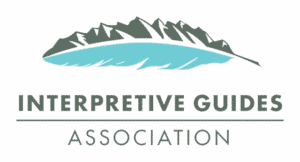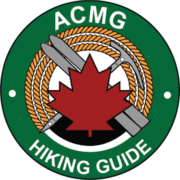Beautiful scenery, incredible wildlife, and awe-inspiring experiences are guaranteed. Mike is a certified ACMG Hiking Guide, passionate about creating and sharing world-class wilderness adventures. You will experience your trip the way an outdoor professional does. All of our trips are rich in experiential learning. We encourage and empower all trip participants to become a part of the adventure. Immerse yourself in learning and gain the confidence and skills to apply to your own trips. Mike strives to offer the added value of personalized coaching for all trip participants. Coaching starts on the day your registration is confirmed and continues for the duration of the trip.
Our ideal trip participant is someone who has a sense of adventure, enjoys being in nature, and is eager to learn new outdoor skills. We love it when participants return for successive trips to learn in new zones and more challenging terrain. Several clients join our guided trips year after year and sometimes two or three times per year.
We specialize in small groups. Most of our multi-day guided trips have a maximum of six participants (Mike guiding five participants). The West Coast Trail has a maximum of seven participants (Mike guiding six participants). The Nootka Trail has a maximum of eight participants (Mike guiding seven participants). Our day hikes in Strathcona Provincial Park have a maximum of eight participants (Mike guiding seven participants).
Smaller groups make less impact on the delicate natural environments we hike in. Trip costs are lower because we don’t have to hire assistant guides. Fewer people also means that each participant receives more of the guide’s time and attention. Our days flow smoother and safer with less delays, variables, or interruptions.
Mike has BC Park Use Permits for Strathcona and Cape Scott Provincial Park since 2011. A new addition in 2016 is a Parks Canada Business Licence for the West Coast Trail Unit and Long Beach Unit of Pacific Rim National Park Reserve. Mike also has authorization to provide guided hiking trips along the Nootka Trail on Nootka Island from Recreation Sites and Trails BC.
As a certified ACMG Hiking Guide, Mike carries Comprehensive General Liability Insurance as directed in ACMG standard of practice and mandated by the Crown, BC Parks, and Parks Canada.
We recommend that all our trip participants have Travel Medical Insurance and Trip Cancellation Insurance.
Difficulty ratings for hiking and backpacking trails are traditionally hard to define. Everyone has a unique level of personal fitness and mental fortitude and will perceive challenges subjectively. Good physical conditioning in one sport doesn’t always translate to backpacking. Also, if someone has a past history of backpacking, but hasn’t done that activity in a long time, they are essentially a beginner again. Check out our trip reports to get a feel for the daily distances and unique challenges of each trip. For example, the physical difficulties of the popular West Coast Trail should not be underestimated. The southeast portion of the trail includes many steep ladder-systems that will affect hikers in different ways. If the weather is wet, mud will be an obstacle on the coastal hikes, making travel slow and difficult. Mountain trips sometimes involve intense sun exposure and considerable elevation gain and drops. All of our trips involve carrying your own backpack up to 8-10 hours a day over challenging terrain.
To enhance your wilderness experience, your body needs to be in shape for backpacking. The more conditioned your body is, the more energy you will have for enjoyment and learning.
The best way to train is to go on as many walks, day-hikes, and shorter backpacking trips as possible. Practice putting all your gear in your pack and carrying it around. The more you make hiking a part of your lifestyle, the more enjoyable your backpacking adventure will be. Even urban hiking on city sidewalks will help with physical conditioning if you can’t get to trails all the time. Seek soft ground and natural terrain when you can (e.g. local parks, hills, or beaches). Strength training is helpful for overall conditioning and muscular endurance. Always check with you doctor before embarking on a new training program.
Our goal is to get our packs as light as possible. During the pre-trip planning phase, we will share lightweight gear recommendations and backpacking tips. We’ve noticed that the four outdated (and therefore big and heavy) pieces of equipment people often bring include the backpack, tent, sleeping bag, and sleeping pad. We recommend investing in lighter packs and sleep systems. On the trip, we will teach you how to use your gear more efficiently. Check out our trip reports to see what gear we have experimented with. We are constantly looking for ways to lighten our own packs and increase efficiency.
We provide all of the group safety equipment. Each participant brings their own personal backpacking equipment.
During the pre-trip planning phase, we will share our gear lists and instruct you on how to choose proper gear for the trip.
Yes. Each person carries their own water. Typically, fresh water is readily available along all the trails we hike. We always perform an environmental assessment pre-trip to anticipate any water problems. On trips, we carry a one litre soft bottle each and recommend that all participants do the same. Some people choose to carry more water than one litre.
Yes. We recommend treating the water on all of our trips to reduce the chance of waterborne illnesses. We always carry a personal filter and backup tablets for treating water in the backcountry.
Yes. Each participant carries their own food. During the pre-trip planning phase, we will share our menu plans and instruct you on how to choose proper food for the trip.
Yes. Everyone purchases, carries, and prepares their own meals. Dehydrated food is great for the backcountry because it is lightweight and easy to prepare. You will need a small stove system to boil water because fires are either illegal or impractical.
Yes. Everyone takes care of their own dishes. We teach the best leave-no-trace practices so everyone learns the most efficient methods of clean-up.
Depending on the trip, we will camp in either designated backcountry sites or primitive wilderness sites that impact the environment the least. Designated sites sometimes have wooden tent platforms. Primitive sites will be on durable surfaces. On coastal trips, we often camp right on the sandy beach.
Yes. Everybody sets up their own shelter, sleep system, and manages their own gear. We will share our ideas around efficient camp set up and gear management.
We do environmental assessments together in the weeks leading up to the trip. Summertime on Vancouver Island usually has mild temperatures; however, we need to be prepared for unexpected changes. Everyone must bring the appropriate gear for the conditions we may encounter.
Campfires are illegal in Strathcona Provincial Park. Campfires are sometimes allowed in designated areas on the coastal trips. Leave-no-trace principles are always in effect.
Some designated backcountry campsites have parks-maintained outhouses. Other routes with primitive wilderness sites require that we go to the bathroom in the great outdoors. We will instruct our trip participants on leave-no-trace principles in these areas.
Check out our trip reports for detailed conditions and photos.
The trip will run rain or shine. We only reschedule a trip if environmental conditions are deemed unsafe.
Possibly. We insist that all our trip participants bring appropriate outerwear. We have a group tarp that we set up at camp to create a common sheltered area.
Yes. We will stay clean using natural bodies of water, such as the ocean, waterfalls, or mountain lakes. Some bodies of water or creeks are water sources for backcountry campers…those are not appropriate for bathing. Bring a small washcloth and towel and we will show you the best spots to clean up along the way.
One of the great things about Vancouver Island is viewing these incredible animals. We follow professional best practices to keep everyone safe. We will instruct our trip participants on wildlife etiquette.
Mike knows a great deal about Vancouver Island and the creatures who live there. Plus we have several different apps on our devices to help. If there is something Mike doesn’t know, he will look it up so everyone learns together.



